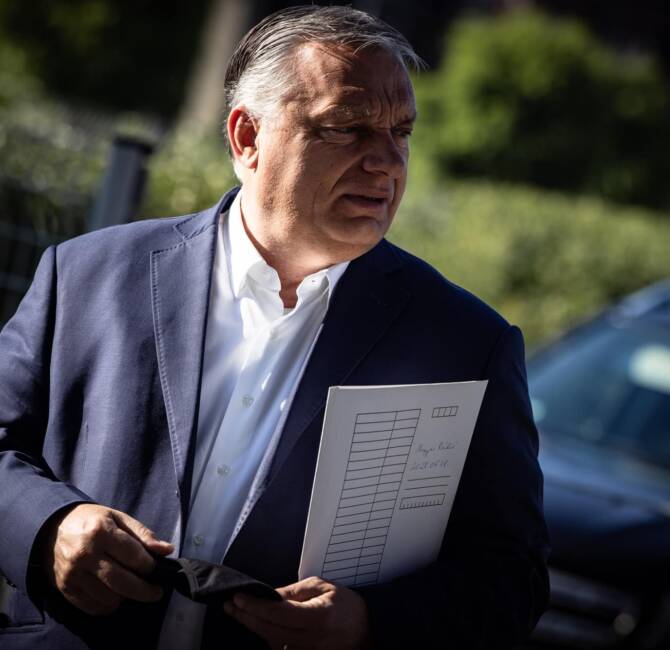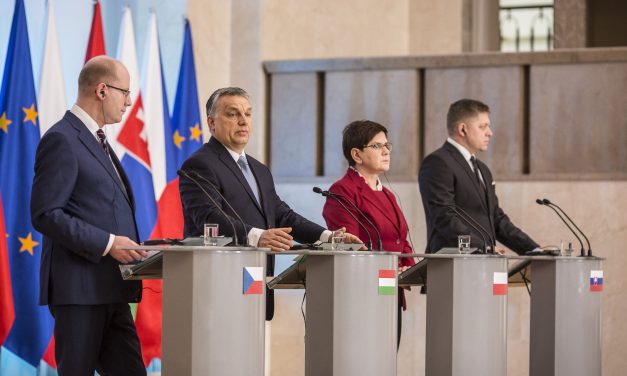Central Europe – The leaders of the V4 nations and Slovenian PM Janez Janša convened in Slovenia last Friday to discuss cooperation between Central Eastern European states (CEE) regarding mass migration, integrity of the nation state and other topics.
Given the outrageous, chilling and downright awkward response from the West EU bloc to Hungary’s anti-pedophilia law, which protects Hungarian children and the natural rights of parents, the timing was critical to display unity and strength in the face of this aggressive onslaught by the EU Parliament and von der Leyen Commission.
This issue does not just involve Hungary, but the entire concept of the sovereign nation state and the very definition of Europe.
This is indeed a very slippery slope that must be avoided and dealt with immediately before more red lines are crossed.
If Hungary goes down, other V4 and CEE countries will be the next targets of the EU juggernaut, whether it involves this issue or something else. Already, far-left members of the EU Commission and Parliament have targeted Slovenia regarding the issue of free speech.
Give an inch and Brussels will seek total submission at every level. It truly does not believe in the European nation state.
Also high on the agenda was the anticipated consequences regarding the withdrawal from Afghanistan, where the CEE leaders stated their grave concerns over an Afghan migration ‘wave’.
Actually, it may be more appropriate to refer to it as the ‘second wave’, considering the fact that many Afghans have already flooded Europe, especially the so-called ‘unaccompanied minors’ (i.e., aggressive males between the ages of 14-17).
However, regardless of the circumstances, as long as rich EU states like Germany and the Netherlands continue to attract the illegals with a powerful welcome magnet, the waves will be endless, and not just from Afghanistan.
“Cooperation between Central Europe countries is not a theory but a practical reality,” Viktor Orbán said, urging the CEE states to speak as one on migration to counterbalance the pro-migration agenda of many in the West EU bloc led by Germany.
The CEE leaders urged the EU to defend the borders.
Yet, Europe has been down this road before, in fact, many times since Merkel’s “we can do it” manifesto of 2015. During that time, the V4 and CEE nations have certainly done their part (and more) to defend Europe, including greatly slowing the illegal migrant pipeline to the ungrateful rich governments of Germany and the Netherlands, both of which are helpless themselves when it comes to denying entry and defending their own borders.
The sheer audacity shown by Angela Merkel to criticize the original Balkan closing that benefited Germany was shameful. “Not my Europe” was the term she used to describe the heroic efforts of Hungary and the CEE states to defend the southern borders.
However, there are still big holes in the EU and new routes are appearing, even if the EU migration minister (Ylva Johansson from Sweden) tries to claim that the crisis is over. Moreover, there is an even bigger problem that has become quite clear over the years: Not every leader inside the bloc has the same definition of “defending borders”.
Common sense and reality means defending borders requires pushing-back an advancing force to prevent entry… but many others, including the EU Commission and a few of the border states, believe defending borders entails sending in Frontex with its fancy equipment to ‘observe and locate’ while constructing new ‘reception’ facilities to increase the capacity to house the illegals granted entry.
Only the EU would consider the latter to be defending the borders, but this is the mindset of Brussels.
Yes, the Afghans and others are coming. Why not? Europe has not demonstrated the ability or will to deport en masse; the inflows far outpace the outflows.
The question is what Europe is going to do about this new wave, which seems like a reoccurring event. Promising future deportations that never materialize in any meaningful way is pure EU bait and an excuse not to seal the borders to prevent entry.
Quite frankly, as it stands now, an EU solution is not possible because the EU does not want to stop migration. It only wants to manage mass migration in an orderly and regular way, which means it will seek to turn illegal migration into legal migration.
The V4 and CEE states must continue to work together, outside of EU parameters, to defend their countries and region. They must finally realize that the EU, after six years of useless solidarity slogans, is entirely focused on relocation schemes and has no plans to stop the waves.
The V4 and CEE states cannot rely on the EU, Erdogan and other foreign leaders, Frontex or the Council of Europe. They must and will do it themselves, working together as an alliance of independent nation states to protect its people, borders and culture.
The second vital step comes down to principle. There can be no declared ‘victories‘ (like the von der Leyen debacle) even if mandatory quotas are not included. The stakes are much higher. The V4 and CEE states must unconditionally defeat the EU-wide reform bill (endless relocations) that will commit all in the EU to mass migration until Europe is overwhelmed into submission.
Migration must be crafted at a national level without interference from Brussels or the EU Parliament. There is one area where the EU can be of assistance to the nation states: coordinating efforts to link ALL EU foreign aid to a country’s willingness to swiftly, without technicalities, accept back it citizens. Other than that (and that’s only because the EU already has a foreign aid budget), the EU is an obstacle and increasing its powers in regards to migration will only exacerbate and deepen the crisis.
The nation states must be given free reign to tackle mass migration on their own, utilizing national methods and regional cooperation, not based on outdated declarations from decades ago, but techniques that reflect the realities of today’s complex environment.
This is a street fight and one cannot win this battle while handcuffed by EU and UN chains.




